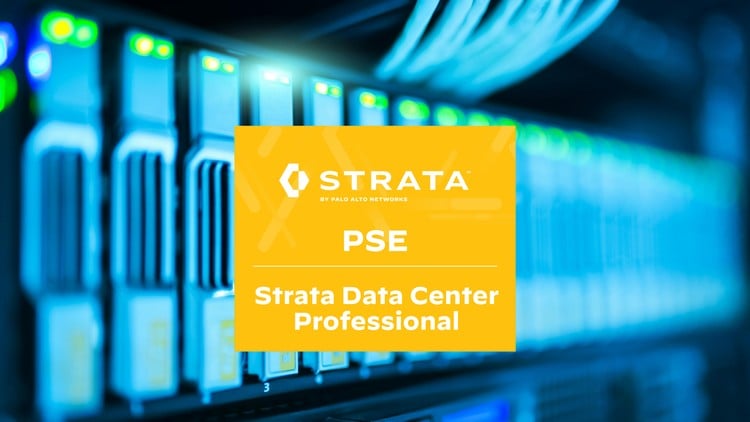
High-quality practice exams to boost confidence, identify weak areas, and prepare you for real test success
👥 17 students
Add-On Information:
Note➛ Make sure your 𝐔𝐝𝐞𝐦𝐲 cart has only this course you're going to enroll it now, Remove all other courses from the 𝐔𝐝𝐞𝐦𝐲 cart before Enrolling!
-
Course Overview
- This comprehensive course is meticulously designed for ambitious IT professionals aiming to achieve the prestigious Palo Alto Networks System Engineer Professional certification, with a specific emphasis on mastering the cutting-edge Strata security platform. It provides an intensive, practice-exam-centric preparation experience, ensuring candidates are not only intimately familiar with the exam format and question types but also deeply understand the core principles, robust architecture, and operational intricacies of Palo Alto Networks’ industry-leading next-generation firewall and advanced threat prevention solutions. The curriculum strategically delves into critical areas such as secure network design, granular policy enforcement, sophisticated threat detection, and the seamless integration of Strata products within complex enterprise environments. Students will gain the strategic insights and tactical knowledge required to confidently deploy, manage, and troubleshoot Palo Alto Networks solutions effectively, positioning them as expert system engineers capable of fortifying modern digital infrastructures against the most sophisticated cyber threats. This course is your definitive pathway to validating your expertise, boosting your confidence, and significantly advancing your career in enterprise-level cybersecurity.
-
Requirements / Prerequisites
- Foundational Networking Knowledge: A solid understanding of TCP/IP, routing, switching, and common network protocols.
- Basic Security Concepts: Familiarity with general cybersecurity principles, firewalls, VPNs, and intrusion prevention systems.
- Experience with Enterprise IT Environments: Practical exposure to managing or operating systems within an enterprise network setting is highly beneficial.
- Palo Alto Networks Basics (Recommended): While not strictly mandatory, prior exposure to Palo Alto Networks concepts or completing an entry-level course (e.g., PCNSA or similar foundational training) will provide a stronger starting point.
- Commitment to Intensive Study: This course is geared towards professional certification and requires dedicated effort and consistent practice.
-
Skills Covered / Tools Used
- Palo Alto Networks Next-Generation Firewall (NGFW) Management: In-depth understanding and practical application of the PAN-OS operating system.
- Security Policy Enforcement: Mastering the creation, optimization, and troubleshooting of security policies, NAT rules, QoS, and user-ID policies.
- Advanced Threat Prevention (ATP): Implementing and configuring WildFire, Threat Prevention, URL Filtering, and Data Filtering profiles to neutralize multi-vector attacks.
- VPN Technologies: Designing and deploying various VPN solutions including IPsec site-to-site, GlobalProtect remote access, and SSL VPNs.
- High Availability (HA) and Scalability: Configuring and managing NGFW high availability modes (Active/Active, Active/Passive) and ensuring network resilience.
- Network Design & Segmentation: Applying best practices for secure network architecture, zone-based segmentation, and virtual wire deployments using Strata capabilities.
- Traffic Inspection & Decryption: Implementing SSL Forward Proxy and SSL Inbound Inspection to analyze encrypted traffic for hidden threats.
- Logging, Monitoring & Reporting: Utilizing Panorama and individual firewall logs for forensic analysis, compliance reporting, and real-time security monitoring.
- User-ID & Group Mapping: Integrating with directory services (LDAP, Active Directory) for user and group-based policy enforcement.
- Application Identification (App-ID): Leveraging App-ID for granular application control and preventing protocol evasion.
- SD-WAN Configuration: Understanding and configuring basic SD-WAN functionalities within the Palo Alto Networks ecosystem.
- Cloud-Delivered Security Services: Exploring the integration and benefits of Palo Alto Networks’ cloud-delivered security services with Strata.
- Troubleshooting Methodologies: Developing systematic approaches to diagnose and resolve common network security issues using CLI and GUI tools.
-
Benefits / Outcomes
- Achieve Professional Certification: Gain the confidence and knowledge necessary to successfully pass the Palo Alto Networks System Engineer Professional – Strata certification exam.
- Validate Expert-Level Skills: Demonstrate a recognized mastery in deploying, managing, and troubleshooting Palo Alto Networks’ advanced security solutions.
- Enhanced Career Opportunities: Position yourself as a highly sought-after cybersecurity professional with specialized expertise in leading next-generation firewalls.
- Strategic Security Implementation: Learn to design and implement robust, multi-layered security architectures that effectively protect enterprise assets.
- Proactive Threat Mitigation: Develop the ability to configure and fine-tune threat prevention mechanisms to proactively defend against evolving cyber threats.
- Operational Efficiency: Master best practices for efficient management, monitoring, and reporting of Palo Alto Networks security infrastructure.
- Confidence in Complex Environments: Build the assurance to tackle challenging security scenarios and contribute significantly to an organization’s security posture.
-
PROS
- Exam-Focused Preparation: Specifically designed with high-quality practice exams to identify weaknesses and build confidence for the real certification test.
- Deep Dive into Strata: Comprehensive coverage of Palo Alto Networks’ advanced Strata platform, crucial for enterprise-level security roles.
- Practical Skill Development: Focus on real-world deployment and troubleshooting scenarios relevant to a System Engineer’s daily tasks.
- Industry-Recognized Expertise: Prepares you for a certification that validates highly valued skills in the cybersecurity market.
-
CONS
- Requires Significant Time Investment: The professional nature of the certification demands substantial dedicated study time and effort.
Learning Tracks: English,IT & Software,IT Certifications
Found It Free? Share It Fast!